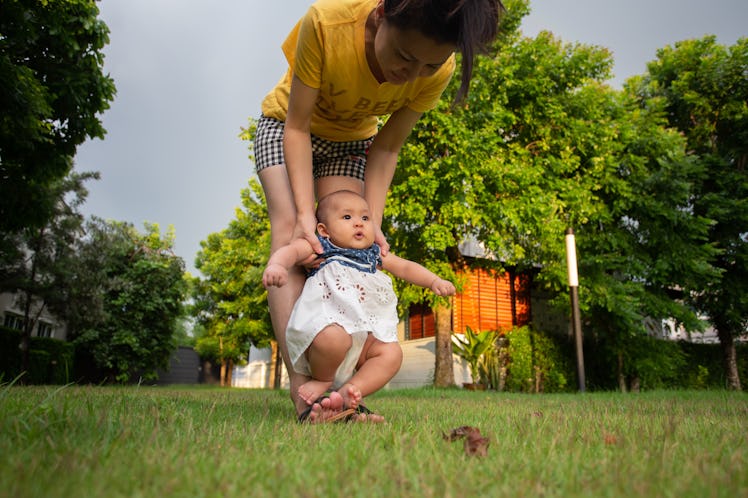Why Do Babies Avoid Grass? Their Nervous Systems Aren’t Ready.
Imagine for a moment that you were incredibly high and had never seen grass before. How would you feel about the front lawn?

We know these two things to be true: Babies hate grass, and the internet loves watching babies avoid touching grass. Over the years, several viral videos have shown grass-avoidant baby behaviors, but the one that first went mega-viral in 2019 is the masterpiece of the genre. A compilation of babies doing pretty much everything they can to keep off the grass, it features a baby in a pink dress who does a version of the splits that would make Jean-Claude Van Damme proud in order to avoid the green blades, and another kid doing that Tom Cruise stunt from the first Mission: Impossible. It’s all extremely adorable and funny. But why? Why do babies avoid grass?
There’s a relatively simple reason: Grass can cause a baby to experience sensory overload.
During the first few months of life, a baby’s nervous system is getting tuned up, developing quickly in a way that makes sounds, sensations, and sights intense and jarring. This experience has been compared by many experts — including Michael Pollan in How to Change Your Mind — to being high on psilocybin. So, if you would, think about grass for a second from the point of view of a man on mushrooms. There are so many blades! It’s so uneven! It tickles, but it’s somehow also rough! It’s wet! It’s just too much.
Now, imagine you’d never even seen grass before. That’s what it’s like to be a baby. The only reason not all babies react this way is that different babies process sensory experiences in different ways. This is also why older children affected by sensory processing issues often avoid grass too.
But the trippiness of grass is not the sole reason a baby might be inclined to keep off the lawn. Babies may be wary of vegetation in general. A Yale study looked at babies’ responses to a variety of objects, including everyday vegetation. The researchers found that when babies were presented with plants, they took a lot longer to decide to touch them when compared to other objects. What’s more, this plant hesitancy occurred in babies as young as 8-months-old.
Sign up for the Fatherly newsletter to get expert advice about fitness, gear, travel, style, parenting, and more in your inbox.
“These results expand the growing literature showing that infants are sensitive to certain ancestrally recurrent dangers,” the study authors conclude. That is to say that babies’ wariness of plants is a natural behavior meant to keep them from getting poisoned. After all, the world is full of plants that have developed toxins as a means of defense against plant-eaters.
It’s possible that as humans evolved, we adapted to the toxicity of plants by becoming instinctually wary of them. That makes sense, particularly given the degree to which babies explore the world with their mouths. In a world thick with toxic — or simply inedible — plants, typical mouthing behavior would put babies at risk if they were not naturally averse to vegetation.
Can we say, for sure, what we’re watching when we see a viral video of a baby avoiding grass? No. But a natural disinclination to vegetation combined with an aversion to sensory overload from grass probably explains the acrobatics. It’s either that or the babies are just being weird. Studies also support the conclusion that babies do weird stuff all the time.
This article was originally published on